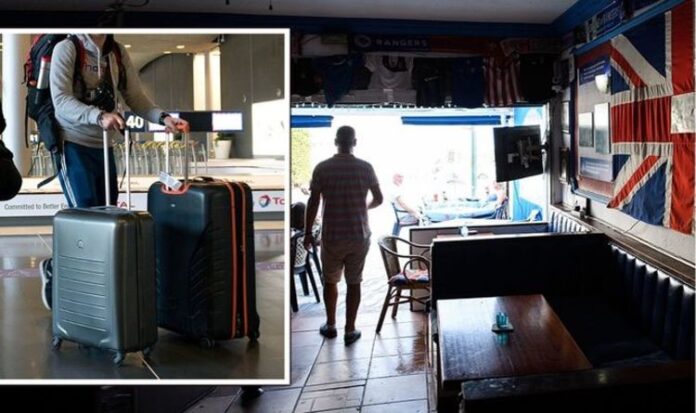In the run-up to the UK’s departure from the EU, Britons living in Spain were urged to register as Spanish residents. Spain’s huge British expat numbers are more than 360,000 people, according to official figures. However, thousands more Britons are also believed to reside in the country unofficially, living “under the radar” of the authorities. Maura Hillen, a legal expert in Spain, has said that unregistered British expats “who wanted to keep their head down and not pay taxes anywhere” now have a choice to make.
The Irish expat, who has lived in Spain for 14 years, and has campaigned for the rights of British expats, is the spokesperson of the property association ‘Abusos Urbanísticos Andalucía No’.
She told Express.co.uk that since Brexit, Britons in the country have faced a decision to “become properly registered or go home – or hide out in the hills.”
From January 31 last year when the UK left the EU, Britons were treated as third country citizens by the bloc.
The 11-month Brexit transition period agreed by London and Brussels came to an end on December 31 last year.
This period provided time for both parties to hammer out a post-Brexit trade deal.
JUST IN: First UK, now Canada! Macron urged to start another trade war over ‘threatened’ sector
It also allowed British expats across Europe, including in Spain, to get their paperwork in order.
Britons who were already registered Spanish residents were able to switch to a new type of Spanish residency during this period.
Known as ‘withdrawal agreement residency’, this also allowed Britons who wanted to live in Spain the option of easily becoming resident.
The transition period allowed expats to switch their residence card for a new one, however now this period has come to an end, the residency process has become more difficult.
Ms Hillen explained that despite the difficulties, most Britons in Spain do have residency, although Brexit has “cleared out” some unregistered expats.
She said: “They weren’t paying taxes in the UK, they weren’t paying taxes here.
“They were living on the gig economy, getting paid cash in hand for work.
“That sort of ‘residency arrangement’ if you like is gone.
“But there are a couple of unfortunate cases, such as elderly people who struggle to deal with the new rules and regulations. People are trying to help them sort it out.”
Despite the difficulties with paperwork , Ms Hillen said that Britons had adapted to the situation.
She added: “Generally speaking, the majority of people that I know, if they were already resident, they’ve complied with all of the new pieces of paper that they needed to get.
“There’s been a bit of moaning but generally they’ve got on with it.”
Express.co.uk approached the Foreign, Commonwealth and Development Office for comment.
A spokesperson said: “The rights of UK nationals to continue living, working and studying in their EU member state are protected by law. Anyone legally resident before January 1 2021 can stay but should register their residence.
“The UK Government has been running a public information campaign across Europe to inform UK nationals about the actions they may need to take to secure their rights and access to services.
“This includes outreach events, adverts on social media and in newspapers, and support through our network of embassies, high commissions and consulates.
“We allocated up to £4million of grant funding to provide support for UK nationals who need additional assistance with their residency applications to ensure support is available.”
“The rights of UK nationals to continue living, working and studying in their
EU Member State are protected by law. Anyone legally resident before 1 January
2021 can stay but should register their residence.
“The UK Government has been running a public information campaign across Europe
to inform UK nationals about the actions they may need to take to secure their
rights and access to services. This includes outreach events, adverts on social
media and in newspapers, and support through our network of Embassies, High
Commissions and Consulates.
“We allocated up to £4million of grant funding to provide support for UK
nationals who need additional assistance with their residency applications to
ensure support is available.”
Credit: Source link









